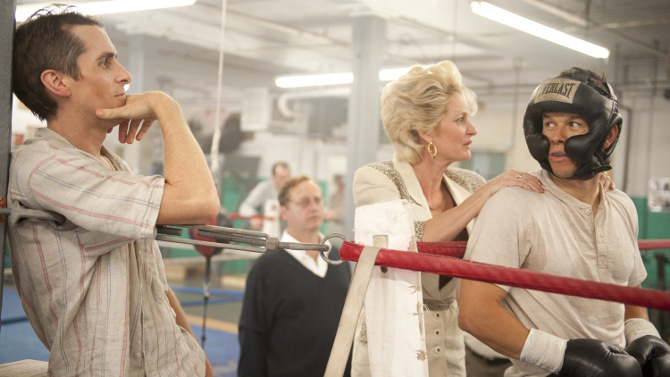An oft-used motif in the sports genre is the underdog story – Rocky, Rudy, Miracle (about the 1980 U.S. Olympic hockey team), and so many others feed off of the audiences love of cheering for the expected loser (as is the case with the stories these films are often based on). One such feature that follows this well trodden path yet finds some new ground to surprise is David O. Russell’s 2010 feature, The Fighter.
Based on real life boxer “Irish” Micky Ward (Mark Wahlberg), the Lowell, Massachusetts native has become a stepping stone for other boxers making their way up towards a title opportunity. Managed by his domineering mother, Alice (Melissa Leo), and trained by his character of a half-brother, Dicky Eklund (Christian Bale) – a former boxer who had potential (going head to head with Sugar Ray Leonard in 1978 – actually knocking the icon down. . . the legend makes a cameo in the film), but has become a crack addict.
Ingrained within his family and the community, other members float around the periphery of his career: his quiet, diminutive father George (Jack McGee), his seven sisters, second trainer Mickey O’Keefe (the real life police sergeant took on the role), and Charlene Fleming (Amy Adams) – a bartender who is just starting out her relationship with Micky, each person influencing his life along the way.
As much a familial drama as a boxing film, Micky is stuck in a number of middles – between his more talented yet unreliable brother and less skilled yet ever-reliable police trainer; between his controlling mother and girlfriend who sees the flaws in the family dynamic; between continuing this devastating journey that features him losing fights in ever more brutal ways or moving on with his life; even his father wants him to change management, in a sense, going against the rest of his family to further his career.
To further tie the narrative to real life, the 1995 HBO documentary High on Crack Street: Lost Lives in Lowell, which featured the Eklund-Ward family, is woven into the story (the director of the doc, Richard Farrell, plays himself), while they utilized HBO crews to film the fights – in essence, echoing how it is done in real life (cameras from the 90s were used for both the documentary and the fight scenes).
An acting masterclass, The Fighter is chock full of stellar performances. Winning an Oscar for both Christian Bale and Melissa Leo, Amy Adams earned a nomination for her turn, while Wahlberg is the rock at the centre of the piece – all coming together, all clicking, be it while depicting unity or chaos. Bale is able to capture the real life boxer’s spastic elasticity, a rubber-like Lowell boy whose bubbling personality is only matched by his crippling addiction to crack – the English actor living the role; while Supporting Actress winner Leo is perfection as the powerful, near-tyrannical matriarch – though she is brutish in her execution, we know that it is coming from a good, albeit flawed place. Adams brings forth a certain spunk, a belief in her man despite her life not following the path it likely should have (a college athlete, alcohol and partying led to her dropping out) – the first person to challenge the Eklund-Ward hierarchy to help redirect Micky’s career. Lastly, Wahlberg’s Micky is simply looking for a happy medium, uniting his entire team (girlfriend and all), though that is easier said than done. Wahlberg must also be commended, as he trained for over four years until the movie got made, refusing to use a stunt double – filming all of the boxing scenes, taking real punches along the way.
Expected in most David O. Russell films, the soundtrack is dynamic. . . The Rolling Stones, Led Zeppelin, Aerosmith, Red Hot Chili Peppers, Whitesnake, The Bee Gees, Dropkick Murphys, Wang Chung, Hall and Oates, as well as several others back the picture – rocking tunes that mesh so well, helping set the tone for the entire movie.
An against-all-odds story, The Fighter is a powerful emotional tale that follows the trail blazing path of motion pictures like Rocky and Raging Bull, but finds new ground in focussing a fair amount on the family dynamic. . . though, like most underdog flicks, is more than a tad predictable (though that does not take away from the emotion captured by the superlative actors or the excellent execution of the production). An interesting sidenote for those who haven’t seen the feature – the film making team decide to conclude before Micky’s three most memorable fights against Arturo Gatti (a sequel has been in development for some time which would feature these bouts). So, take a crack at this title, it’s well worth the undertaking.

